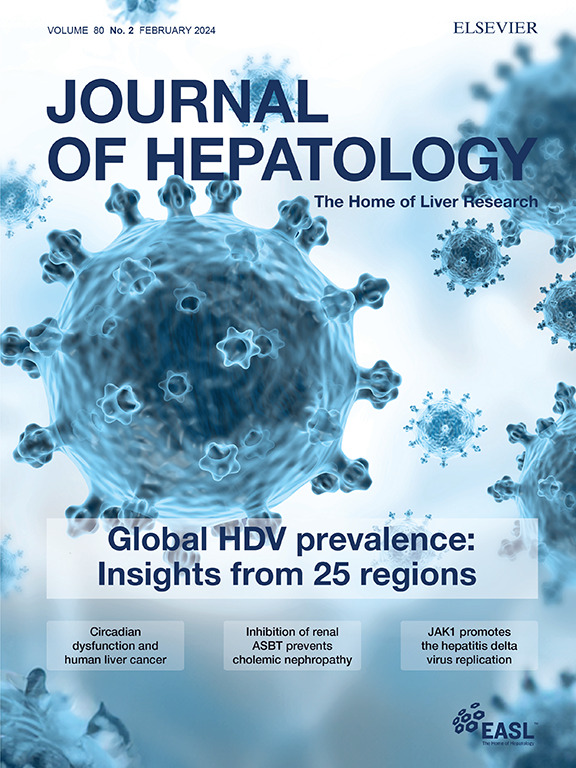抑制 ACMSD 可纠正 MASLD/MASH 的纤维化、炎症和 DNA 损伤。
IF 26.8
1区 医学
Q1 GASTROENTEROLOGY & HEPATOLOGY
引用次数: 0
摘要
背景与目的:最近的发现揭示了色氨酸在肝脏中从头合成烟酰胺腺嘌呤二核苷酸(NAD+)的重要性,这一过程以前被认为是烟酰胺生物合成的次要过程。主要在肝脏和肾脏中表达的α-氨基-β-羧基琥珀酸-ε-半乳糖醛脱羧酶(ACMSD)是从头合成 NAD+ 的调节剂。提高 NAD+ 水平曾在小鼠模型中显示出显著的代谢益处。本研究旨在探讨抑制 ACMSD 在治疗代谢功能障碍相关性脂肪性肝病/骨转移性肝炎(MASLD/MASH)中的治疗意义:体外实验在原代啮齿类动物肝细胞、Huh7 人类肝癌细胞和 iPSC 衍生的人类肝脏器官组织(HLOs)中进行。C57BL/6J雄性小鼠以西式饮食喂养,在恒温条件下饲养,以再现MASLD/MASH的关键环节。发病后,对 ACMSD 进行药理抑制。利用脂肪性肝炎 HLO 模型评估抑制 ACMSD 对人类 DNA 损伤的反应:结果:用一种新型特异性药理抑制剂抑制 ACMSD,可促进 NAD+ 的新合成,减少体内外和 HLO 模型中的 DNA 损伤。在MASLD/MASH小鼠模型中,从头NAD+生物合成受到抑制,DNA损伤转录组特征与疾病严重程度相关;在人类中,基于孟德尔随机化的遗传分析表明基因组应激对肝病易感性有显著影响。治疗性抑制小鼠 ACMSD 可增加肝脏 NAD+,逆转 MASLD/MASH,减轻纤维化、炎症和 DNA 损伤,正如在 HLO 脂肪性肝炎模型中观察到的那样:我们的研究结果凸显了抑制 ACMSD 对提高肝脏 NAD+ 水平和实现基因组保护的益处,强调了其在 MASLD/MASH 中的治疗潜力:在MASLD/MASH小鼠模型中,提高NAD+水平已显示出显著的健康益处,但肝脏特异性NAD+促进策略仍未得到充分探索。在此,我们提出了一种新型药理学方法,通过抑制肝脏中高度表达的一种酶 ACMSD 来增强肝脏 NAD+ 的从头合成。抑制 ACMSD 可提高 NAD+ 水平,增强线粒体呼吸,并保持体内外肝细胞基因组的稳定性。在小鼠和人类脂肪性肝炎肝脏器官模型中,这些分子益处都能防止疾病恶化。我们的临床前研究将 ACMSD 确定为治疗 MASLD/MASH 的有希望的靶点,并为开发 ACMSD 抑制剂作为临床治疗奠定了基础。本文章由计算机程序翻译,如有差异,请以英文原文为准。

ACMSD inhibition corrects fibrosis, inflammation, and DNA damage in MASLD/MASH
Background & Aims
Recent findings reveal the importance of tryptophan-initiated de novo nicotinamide adenine dinucleotide (NAD+) synthesis in the liver, a process previously considered secondary to biosynthesis from nicotinamide. The enzyme α-amino-β-carboxymuconate-ε-semialdehyde decarboxylase (ACMSD), primarily expressed in the liver and kidney, acts as a modulator of de novo NAD+ synthesis. Boosting NAD+ levels has previously demonstrated remarkable metabolic benefits in mouse models. In this study, we aimed to investigate the therapeutic implications of ACMSD inhibition in the treatment of metabolic dysfunction-associated steatotic liver disease/steatohepatitis (MASLD/MASH).
Methods
In vitro experiments were conducted in primary rodent hepatocytes, Huh7 human liver carcinoma cells and induced pluripotent stem cell-derived human liver organoids (HLOs). C57BL/6J male mice were fed a western-style diet and housed at thermoneutrality to recapitulate key aspects of MASLD/MASH. Pharmacological ACMSD inhibition was given therapeutically, following disease onset. HLO models of steatohepatitis were used to assess the DNA damage responses to ACMSD inhibition in human contexts.
Results
Inhibiting ACMSD with a novel specific pharmacological inhibitor promotes de novo NAD+ synthesis and reduces DNA damage ex vivo, in vivo, and in HLO models. In mouse models of MASLD/MASH, de novo NAD+ biosynthesis is suppressed, and transcriptomic DNA damage signatures correlate with disease severity; in humans, Mendelian randomization-based genetic analysis suggests a notable impact of genomic stress on liver disease susceptibility. Therapeutic inhibition of ACMSD in mice increases liver NAD+ and reverses MASLD/MASH, mitigating fibrosis, inflammation, and DNA damage, as observed in HLO models of steatohepatitis.
Conclusions
Our findings highlight the benefits of ACMSD inhibition in enhancing hepatic NAD+ levels and enabling genomic protection, underscoring its therapeutic potential in MASLD/MASH.
Impact and implications
Enhancing NAD+ levels has been shown to induce remarkable health benefits in mouse models of metabolic dysfunction-associated steatotic liver disease/steatohepatitis (MASLD/MASH), yet liver-specific NAD+ boosting strategies remain underexplored. Here, we present a novel pharmacological approach to enhance de novo synthesis of NAD+ in the liver by inhibiting α-amino-β-carboxymuconate-ε-semialdehyde decarboxylase (ACMSD), an enzyme highly expressed in the liver. Inhibiting ACMSD increases NAD+ levels, enhances mitochondrial respiration, and maintains genomic stability in hepatocytes ex vivo and in vivo. These molecular benefits prevent disease progression in both mouse and human liver organoid models of steatohepatitis. Our preclinical study identifies ACMSD as a promising target for MASLD/MASH management and lays the groundwork for developing ACMSD inhibitors as a clinical treatment.
求助全文
通过发布文献求助,成功后即可免费获取论文全文。
去求助
来源期刊

Journal of Hepatology
医学-胃肠肝病学
CiteScore
46.10
自引率
4.30%
发文量
2325
审稿时长
30 days
期刊介绍:
The Journal of Hepatology is the official publication of the European Association for the Study of the Liver (EASL). It is dedicated to presenting clinical and basic research in the field of hepatology through original papers, reviews, case reports, and letters to the Editor. The Journal is published in English and may consider supplements that pass an editorial review.
 求助内容:
求助内容: 应助结果提醒方式:
应助结果提醒方式:


